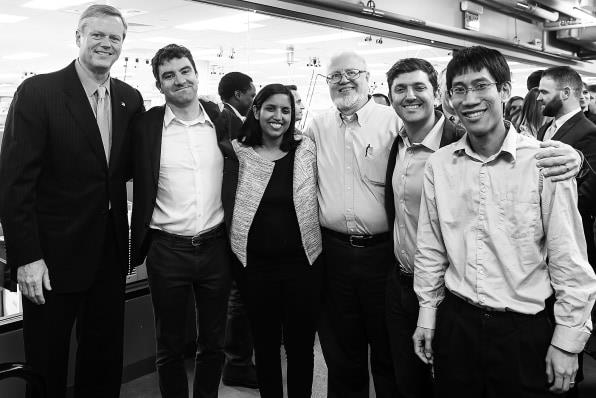Synthetic biology’s biggest cheerleader takes his company public
Sitting in his living room in a white lounge chair, Ginkgo Bioworks CEO Jason Kelly is holding up a worn copy of Michael Crichton’s Jurassic Park. “I was like, I’ve got to nerd out. I haven’t read Jurassic Park since I was 12,” he says.
The rereading of Jurassic Park is in honor of Ginkgo Bioworks going public today via a special acquisition corporation. Ginkgo, which helps other companies program cells to make new organisms, began trading at $11.15 per share today on the New York Stock Exchange under the ticker symbol $DNA. The deal garnered the company $1.6 billion at a scandalous $15 billion valuation.
What makes the deal so eye-popping (aside from being one of the biggest SPACs to date) is that Ginkgo Bioworks has little proof points for its business—yet. In the first half of this year, the company generated $88 million in revenue. In the same period the year prior, the company earned just $31 million. The company is growing, but it is still very far from its purported value. It’s also not totally clear how exactly it will get to the promised land.
Kelly is something of a hype man for the entire field of synthetic biology and makes comparisons between cell programming and the dawn of the computer age (though he’s not the only one to do so). He frequently refers to Ginkgo Bioworks’ labs as a platform and the companies it contracts with as “apps.” The idea is that cells can be programmed to make just about anything. Like computer programmers write code to make digital products, so too can DNA be written and edited to generate something entirely new.
One example of the kind of work Ginkgo does is a bacterial cell it made for biologics company Aldevron. The company needed a better way of producing vaccinium capping enzyme, a component of mRNA vaccines. Ginkgo delivered a cell that was 10 times more efficient at making VCE than the process Aldevron had previously been using. Ginkgo is also designing cells that can be used to make better meatless meat, by a company called Motif Foodworks.
On our call, Kelly likened Ginkgo Bioworks’ stock market debut to Netscape’s (Netscape famously went public a year into existence with no indication that it could be profitable). But this is not a clean comparison, as Ginkgo has been around for well over a decade.
In that time, it has completed few projects, though Kelly notes that it can take one to three years to program cells for a company. In total, Ginkgo will have 80 client projects on the books for 2021. “You can think of this like the development cycle for the new Apple iOS, which takes a few years,” he says.

Another project that Ginkgo Bioworks has been working on is building out the burgeoning field of synthetic biology—in some cases very literally. In order for Kelly’s business to succeed, there need to be a bevy of large and small businesses that need its services. That’s why the company has spun-off a series of smaller companies that fill that gap. For instance, Motif is a spin-out of Ginkgo Bioworks focused on developing new plant-based proteins. Joyn Bio, which was the second company to spin out of Ginkgo, is working on microbes that can more sustainably fertilize farms. Allonia, yet another spin-out, makes compounds to break down waste. Ginkgo also has a whole fund devoted to these companies, raising $350 million in 2019 to that end.
Kelly seems to launch new companies almost effortlessly. During the pandemic, he started Concentric by Ginkgo, a pooled testing company that now has contracts with schools around the country. Kelly says in the last three months the company has signed $400 million in contracts to do K-12 testing.
Kelly is far from the only synthetic biology company to make comparisons between cell writing and editing and the dawn of the computer age. But the gimmick has been effective at attracting investors. Before taking the company public, Ginkgo raised more than $800 million in venture capital at a $4 billion valuation. Part of the reason that Kelly wants to go public now is because he thinks general investors understand the market opportunity.
“I’ve always felt like private rounds were easier for us because I could just spend more time with these big institutional investors,” he says. “It was just such a thing to educate people. And I think what started to happen is you’re getting successes out the door.”
The successes may be more feats of investing than true business icons. While fervor for synthetic biology has amassed in the wake of mRNA vaccines and gene-editing phenom CRISPR, there still aren’t juggernauts in the category. On health site Stat’s podcast the Read Outloud, Stat reporter Adam Feuerstein muses, “I wonder how much of that $15 billion valuation is just because people think that [Ginkgo] is a tech company and not essentially a tools company.”
Given that Ginkgo will merge with Soaring Eagle Acquisition Corp., a blank check company led by Harry Sloan, the man who took online betting company DraftKings public, Feuerstein may be onto something. Kelly acknowledges there are big differences between computers and cells. In computers, code and algorithms can deliver repeatable results. “You run the same code [and] every time you get the same output,” he says. “Biology is not like that.”
At the outset of Jurassic Park, when scientists have brought back dinosaurs from extinction, they make a decision to keep all the dinosaurs female so they can’t reproduce and the population can be controlled. Of course, “life finds a way,” and it turns out that the dinosaurs, through a strange turn of biology, can in fact spawn. Science, we learn, is never so easily controlled. Likewise, the success of synthetic biology may not exactly replicate the success of the digital economy—at least not in the ways we think it will.
(23)



